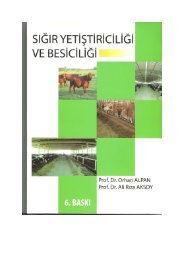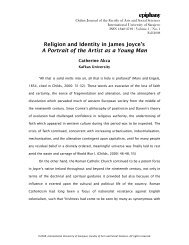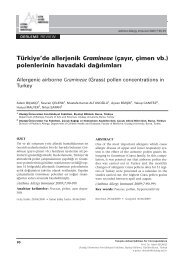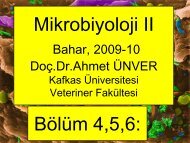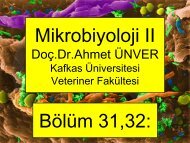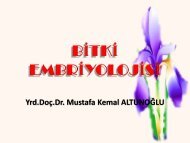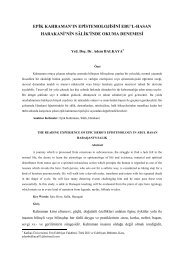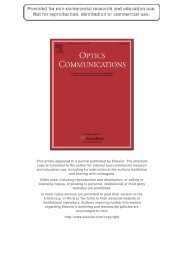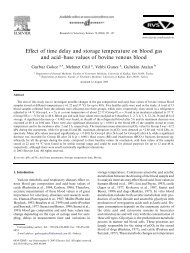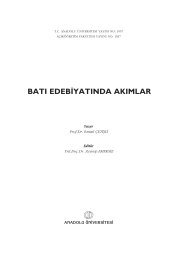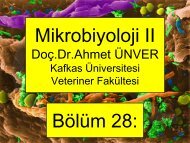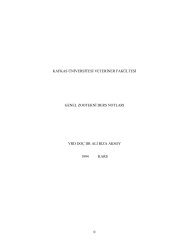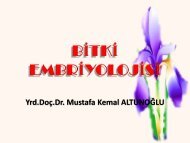effects of l-carnitine administration on growth performance
effects of l-carnitine administration on growth performance
effects of l-carnitine administration on growth performance
You also want an ePaper? Increase the reach of your titles
YUMPU automatically turns print PDFs into web optimized ePapers that Google loves.
382 C. ARSLAN et al.<br />
Ducks are genetically predisposed to the fatness. Excessive fat in ducks is<br />
unattractive to c<strong>on</strong>sumers who are c<strong>on</strong>cerned about the negative <str<strong>on</strong>g>effects</str<strong>on</strong>g> <str<strong>on</strong>g>of</str<strong>on</strong>g><br />
saturated fat intake <strong>on</strong> health. Different studies c<strong>on</strong>ducted <strong>on</strong> weaned pigs<br />
found that L-<str<strong>on</strong>g>carnitine</str<strong>on</strong>g> supplementati<strong>on</strong> in diet could reduce carcass fat and<br />
improve feed c<strong>on</strong>versi<strong>on</strong> efficiency (Weeden et al., 1991; Owen et al., 1996). In<br />
poultry, the <str<strong>on</strong>g>effects</str<strong>on</strong>g> <str<strong>on</strong>g>of</str<strong>on</strong>g> L-<str<strong>on</strong>g>carnitine</str<strong>on</strong>g> additi<strong>on</strong> to the diet are less clear. There have<br />
been several results indicating that L-<str<strong>on</strong>g>carnitine</str<strong>on</strong>g> supplementati<strong>on</strong> <str<strong>on</strong>g>of</str<strong>on</strong>g> broiler diets<br />
improved <strong>growth</strong> rate, feed c<strong>on</strong>versi<strong>on</strong> efficiency, breast and thigh meat yield<br />
and reduced abdominal fat in broilers (Rabie et al., 1997a,b; Rabie and<br />
Szilagyi, 1998). However, Barker and Sell (1994), Leibetseder (1995), and Buyse<br />
et al. (2001) failed to observe any positive <str<strong>on</strong>g>effects</str<strong>on</strong>g> <str<strong>on</strong>g>of</str<strong>on</strong>g> L-<str<strong>on</strong>g>carnitine</str<strong>on</strong>g> supplementati<strong>on</strong><br />
<strong>on</strong> diet or drinking water (Rodehutscord et al., 2002) <strong>on</strong> broiler<br />
<strong>performance</strong>.<br />
In several species, including rabbits (Bell et al., 1987) and rats (M<strong>on</strong>dola et al., 1992)<br />
dietary L-<str<strong>on</strong>g>carnitine</str<strong>on</strong>g> supplementati<strong>on</strong> decreased serum cholesterol and triglyceride levels.<br />
In c<strong>on</strong>trast, it is noticed that L-<str<strong>on</strong>g>carnitine</str<strong>on</strong>g> supplementati<strong>on</strong> in the diet did not affect<br />
serum cholesterol levels in broilers (Lien and Horng, 2001). Any literature related to the<br />
usage <str<strong>on</strong>g>of</str<strong>on</strong>g> L-<str<strong>on</strong>g>carnitine</str<strong>on</strong>g> and its effect <strong>on</strong> abdominal fatty acid compositi<strong>on</strong> in duck feeding<br />
could not be found.<br />
In the current study, the <str<strong>on</strong>g>effects</str<strong>on</strong>g> <str<strong>on</strong>g>of</str<strong>on</strong>g> L-<str<strong>on</strong>g>carnitine</str<strong>on</strong>g> <str<strong>on</strong>g>administrati<strong>on</strong></str<strong>on</strong>g> via drinking water <strong>on</strong><br />
<strong>growth</strong> <strong>performance</strong>, carcass traits, blood parameters and abdominal fatty acid<br />
compositi<strong>on</strong> were investigated in Turkish native ducks.<br />
2. MATERIALS AND METHODS<br />
2.1. Animals and treatments<br />
One hundred, unsexed, day-old Turkish native duck chicks were divided into two<br />
groups, each with five replicates, c<strong>on</strong>taining 10 chicks. Both groups were fed the<br />
diets prepared to meet Nati<strong>on</strong>al Research Council (NRC, 1984) recommendati<strong>on</strong><br />
for ducks (Table I). Additi<strong>on</strong>ally, 0 (C<strong>on</strong>trol group) and 200 mg/l <str<strong>on</strong>g>carnitine</str<strong>on</strong>g><br />
chlorhydrate (Carnitine group) (Hepabial Carnitine, SOGEVAL Laboratoire,<br />
France) were administrated via drinking water. Due to the <str<strong>on</strong>g>carnitine</str<strong>on</strong>g> chlorhydrate<br />
being in a liquid form, it was <str<strong>on</strong>g>of</str<strong>on</strong>g>fered via drinking water. The study lasted 8<br />
weeks, with the first 4 weeks as a starter and the last 4 weeks as a <strong>growth</strong><br />
period. Ducklings were placed in electrically heated battery brooders for the first<br />
2 weeks and c<strong>on</strong>tinuous incandescent lights were sh<strong>on</strong>e. At 15 days <str<strong>on</strong>g>of</str<strong>on</strong>g> age, the<br />
ducklings were transferred to a feeding platform (1 m 6 2m685 cm) made from<br />
metal, which c<strong>on</strong>sisted <str<strong>on</strong>g>of</str<strong>on</strong>g> a 1 cm mesh wire floor, over a c<strong>on</strong>crete floor. After the<br />
sec<strong>on</strong>d week the study was c<strong>on</strong>ducted at room temperature (208C). Diets and<br />
water were available at all times during the experimental period. Water<br />
c<strong>on</strong>sumpti<strong>on</strong> <str<strong>on</strong>g>of</str<strong>on</strong>g> <str<strong>on</strong>g>carnitine</str<strong>on</strong>g> groups were m<strong>on</strong>itored but net water c<strong>on</strong>sumpti<strong>on</strong><br />
could not be estimated due to excessive use <str<strong>on</strong>g>of</str<strong>on</strong>g> water by ducks either for drinking<br />
or play. It is well known that a growing chicken drinks approximately twice as<br />
much water as the feed it c<strong>on</strong>sumes (NRC, 1984). L-<str<strong>on</strong>g>carnitine</str<strong>on</strong>g> intake by ducks<br />
might be estimated with fortnightly feed intake in this study. Additi<strong>on</strong>ally, studies<br />
have already shown that L-<str<strong>on</strong>g>carnitine</str<strong>on</strong>g> supplementati<strong>on</strong> did not affect water intake<br />
(C¸ elik and O¨ ztu¨ rkcan, 2003).



